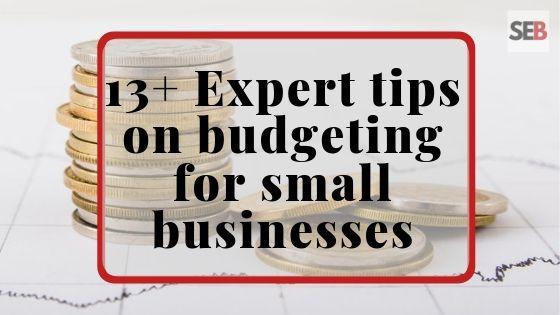In business, every kobo counts; this is especially true for businesses on shoestring budgets.
As a small business owner, you understand you have to milk every drop of value from each kobo spent.
You understand you have to spend the limited money in critical areas that drive business objectives.
Here’s where budgeting for small businesses comes in. And, even if you are flushed with cash, you still need to prepare a budget for your business.
Want to Grow Your Real Estate Business? Download the Complete Grant & Funding eBook for instant access to grants, guides, and more. 80+ Grant and Scholarship Opportunities (FG, State-by-State, General & Underrepresented Groups Scholarships, Plus Grant Writing Checklist). 900+ Copies Sold Already. Get Your Copy Now
According to the Small Business Administration, 82% of small businesses fail as a result of cash flow issues.
Cash flow challenges are exactly what budgets set out to solve. A detailed, well-prepared budget should provide you with all the information about how much money you need to run your business efficiently.
It should – the budget, that is – account for all the costs associated with your business; plus make allowance for any unexpected expense that might crop up.
The budget should also forecast an estimate of how much revenue your small business will rake in for the year.
This way, you can see beforehand if there are any cash shortfalls and take steps to off set.
However, a survey by Clutch found that out of 302 small businesses that participated in the survey two-thirds or 61% of the businesses don’t have a formally documented budget.
Now, the question becomes, why aren’t more small business owners creating budgets for their business venture?
Data from the survey showed that businesses with less than 10 employees tend not to have any budget and as the business grows they tend to have an official documented budget.
The reason could be that as a small business, it is a lot easier to keep an eye on the firm’s operations without the need for an external accountability budgeting brings on the table.
But, is that a good enough reason?
Here are business driven reasons every small business should have a budget:
Budgeting for small businesses: Why budgets are important for your small business
Budgets are the bedrock for planning
Once you know the amount coming in and going out, it becomes easier to make plans for the business.
You’d know just how much the business can afford for marketing expenses, employee benefits, and how much profit to expect.
Budgets help you restrict spending on items not on the budget
With a solid budget in place and the willingness to stick to it, you’ll have a reference point to identify unbudgeted items when the crop up.
You can confidently forecast revenue
An essential component of budgeting is the revenue estimate. It’s a lot easier to predict how much you’d need to run your business efficiently once you’ve identified all the costs associated with the venture.
With this in place, you now need to figure out how much to price your products or services and or the sales volume you need to make to meet your revenue target.
Helps you identify areas of great financial needs for your business and to allocate resources accordingly
Budgeting is a great way to identify areas of core importance for your business.
It helps you see where most of the money is going and to either allocate more money to it or cut back on spending in those areas.
Ensures you have enough money to meet your obligations
Your budgets takes into account all your current financial obligations and includes them as a line item.
This way, you’re able to fund those items as you go.
Budgets come in handy when wooing investors
Investors want to be sure you have a grasp of your finance. What better way to show them than through your budgets?
And, if you’re able to stick to the budget, it goes a long way to build trust in the investors that you’re disciplined enough to handle their money.
Budgets make tax preparation a lot easier
During tax seasons, you don’t have to worry or spend hours searching for your invoices and receipts to file your tax report since all transactions are recorded in a central system.
All you have to do is pull out the records and fill in your tax form.
Expert tips on budgeting for small businesses

Now, you know why you need a solid business budget for your small business venture. The next question, I can imagine on your mind right now is, what practical steps do you take to start budgeting for your small business?
To answer this question, we gathered every expert tips on budgeting we could find online; most of them, from real business owners just like you.
Steve Jordan – Senior Manager, Wipfli in Rockford, Illinois USA
Understand what a budget really is. Your budget is not supposed to micromanage every penny you spend. It should simply act as a guide for better spending habits…
Also, maintain the right mindset while creating your budget, if you harbor a negative attitude from on the set, it could greatly diminish the chances of creating an effective budget.
Dave Ramsey – Founder, Dave Ramsey Show, 5x NY Times Bestseller, Personal Finance expert
On Debt. Dave says:
Forget the conventional wisdom that debt, when used properly, is good. Don’t launch your business saddled with huge debt.
Fact is, you might not even need the financing, at least that’s what Census Bureau data says – 60% of all small businesses launched in a given year need less than $5,000 startup capital.
Besides, if you can’t save money, you probably won’t be able to repay the debt anyway.
James Canaan – Chairman, Start-up Loan Company
Make sure to dedicate time to budgeting. Reach out to your accountant if possible, or seek assistance from a financial team to provide you with estimates for your budget.
It is possible also, as an entrepreneur, you’re bootstrapping and can’t afford expert services at the moment – make sure your budget is realistic.
Melinda Emerson – The @Smallbizlady
Budget every dollar spent on your business. Successful businesspeople understand the importance of using budgets and realistic sales projections to run their ventures.
By the middle of every month, they already know how well their business performed the previous month.
They do not spend money on events, travels, or trade fairs that are not budgeted.
Uyo Okebie-Eichelberger – Made with Love Brands
Cash flow is the lifeline of every business. Think big, act small – create categories like Marketing, finance, etc. Be proactive, not reactive.
And above all, keep track of your monthly progress. Notice any change in spending trend, ask questions to understand why.
Eleni Cotsis – LinkedStartups
Outsource where possible. One excellent way small businesses can save money is to outsource some of their marketing needs.
For example, outsourcing content writing and marketing assistants abroad can save you huge money.
It also, incredibly easy to find team members living in low-cost areas willing to work remotely. This tip can shave off thousands from your budget.
Paul Cho – Managing Director, Headway Capital
Every businessperson should consider the short and long term risks of their business when preparing a budget.
Questions like, “How will change in the minimum wage or health care requirements impact your business?” Are you operating from a high-risk area?
Once you’re able to answer these questions, then contingency plans can be developed to tackle any threat to productivity.
David Worrell – Author of The Entrepreneur’s Guide to Financial Statements
Prioritize proper accounting methods. As you know, every businessperson wants to run a profitable venture; but just a few are willing to take the time to measure actual results.
Just as sales can’t happen without attending to your prospects, you can’t mamke good financial decisions without paying attention to the numbers.
Sure, you might wing it during good times; but it is certainly impossible to navigate lean months without clear financial records.
Kelsa Dickey – Fiscal Fitness Phoenix, Inc
Create a fixed expense paycheck. The idea is to eliminate the need to pull money off your business for personal needs.
Determine how much you need to live off per month; then, create a paycheck structure, where you can automatically pay into the checking account twice in a month. Include this as a line item in your budget.
This becomes a fixed business expense. Another benefit is that it helps you stick to a personal budget.
Jacob Dayan – Community Tax & Finance Pal
Does it make sense to sacrifice productivity just to save some dollar? Some small business owners think it’s a waste of resources to outsource say IT needs.
Hence, often ask their employees to sort out their computer problems which could mean lost hours.
Instead, business owners should factor in outsourced IT help in their budget, so their staff an focus on doing the things they were hired to do in the first place.
Zac Johnson – Founder, Blogging.org
Use technology to cut back on startup costs. It’s a lot easier to start a business today; you can do that on a minimal budget with the right online resources and tools.
Use social media marketing automation tools like Hootsuite, accept payments on with services like Stripe and Payoneer. Send invoices using invoice.ng and Freshbooks.
And eliminate the need for traveling with live video conferencing programs like Zoom and Skype
Nicholas Testa – One Up Nutraceuticals
Never borrow money for this one thing – marketing.
My biggest budgeting mistake has been borrowing money for marketing. Thing is, there’s no guaranty you’d get your money back.
If you want to borrow, let it be for things you’re reasonably sure to get your money back. Like when demand is high, and you’re short on stock.
Christen Luken – The Financial Lifeguard
Take spending off of autopilot. I often advise small business owners to scrutinize every automatically billed expense to make sure they are using those services.
It’s pretty easy to charge those services to your credit card and forget about it.
For example, if you’ve signed up for an exclusive newsletter say for $50 a month and really read it. That’s like $600 per year you could have spent some other place.
Steve Stapp – CEO of San Francisco Federal Credit Union
Stay hands-on with your business finances. Pay close attention to your organization’s financials. Many business owners are buried under operational issues, marketing, and what not; and may not be paying enough attention to their numbers, cash flows, and financial reports.
Reviewing your budgets twice in a year will not cut it; try to ream it up to once every month.
Annesa L. Lacey – B2B Ghostwriter @.I.interpretations
Split the deposit into different accounts. For instance, I often set up project budgets this way:
Premium paid subscriptions for project-related data.
A-Game – for conferences, seminars, and training.
Tech – maintenance to keep my work tools serviced.
Murphy’s law targeted towards emergencies.
Thing is, as a freelance ghostwriter, my clients expect I have the relevant data, know-how, and technology to deliver on their projects.
So, there you have it. Let me know if we missed out any thing. What tip(s) is your favorite?

